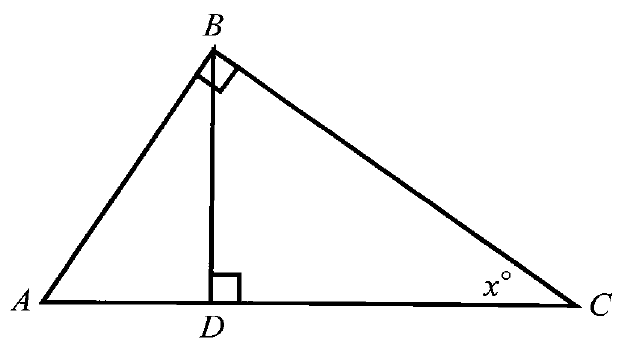VOLUME OF PRISMS AND CYLINDERS
The volume of a solid is the number of cubic units contained in its interior.
Volume is measured in cubic units, such as cubic meters (m3).
Volume Postulates
Postulate 1 (Volume of a Cube) :
The volume of a cube is the cube of the length of its side.
That is
V = s3
Postulate 2 (Volume Congruence Postulate) :
If two polyhedra are congruent, then they have the same volume.
Postulate 3 (Volume Addition Postulate) :
The volume of a solid is the sum of the volumes of all its non-overlapping parts.
Finding the Volume of a Rectangular Prism
Example 1 :
The box shown below is 5 units long, 3 units wide, and 4 units high. How many unit cubes will fit in the box ? What is the volume of the box ?
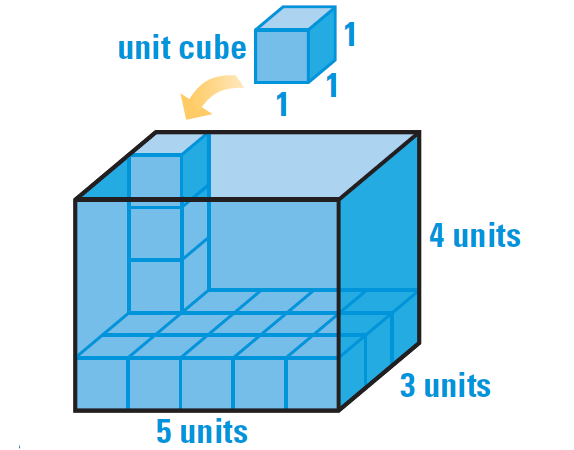
Solution :
The base of the box is 5 units by 3 units. This means 5 • 3 or 15 unit cubes, will cover the base.
Solution (a) :
Three more layers of 15 cubes each can be placed on top of the lower layer to fill the box. Because the box contains 4 layers with 15 cubes in each layer, the box contains a total of 4 • 15, or 60 unit cubes.
Solution (b) :
Because the box is completely filled by the 60 cubes and each cube has a volume of 1 cubic unit, it follows that the volume of the box is 60 • 1, or 60 cubic units.
Note :
In the above example, the area of the base, 15 square units, multiplied by the height, 4 units, yields the volume of the box, 60 cubic units. So, the volume of the prism can be found by multiplying the area of the base by the height. This method can also be used to find the volume of a cylinder.
Cavalieri’s Principle
Theorem (Cavalieri’s Principle) :
If two solids have the same height and the same cross-sectional area at every level, then they have the same volume.
The above Theorem is named after mathematician Bonaventura Cavalieri (1598–1647). To see how it can be applied, consider the solids below.
All three have cross sections with equal areas, B, and all three have equal heights, h. By Cavalieri’s Principle, it follows that each solid has the same volume.

Volume Theorems
Theorem 1 (Volume of a Prism) :
The volume V of a prism is
V = Bh
where B is the area of a base and h is the height.
Theorem 2 (Volume of a Cylinder) :
The volume V of a prism is
V = Bh
V = πr2h
where B is the area of a base, h is the height, and r is the radius of a base.
Finding Volumes
Example 2 :
Find the volume of the right prism shown below.
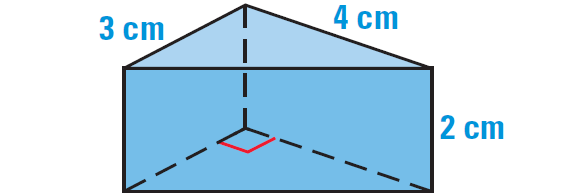
Solution :
The area of the base is
B = 1/2 ⋅ (3)(4)
B = 6 cm2
The height is
h = 2 cm
Formula for volume of a right prism is
V = Bh
Substitute 6 for B and 2 for h.
V = (6)(2)
V = 12
So, the volume of the right prism is 12 cubic cm.
Example 3 :
Find the volume of the right cylinder shown below.
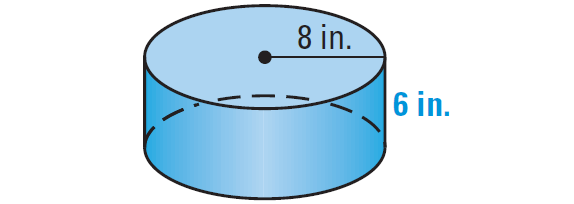
Solution :
Formula for volume of a right cylinder is
V = πr2h
Substitute 8 for r and 6 for h.
V = π(82)(6)
Simplify.
V = 384π
Use calculator.
V ≈ 1206.37
So, the volume of the right cylinder is about 1206.37 cubic inches.
Using Volumes in Real Life
Example 4 :
If a concrete weighs 145 pounds per cubic foot, find the weight of the concrete block shown below.
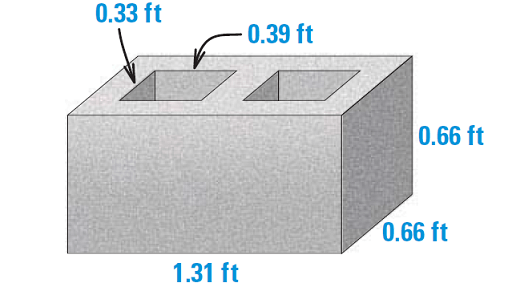
Solution :
To find the weight of the concrete block shown, we need to find its volume.
The area of the base can be found as follows :
B = Area larger rectangle - 2 ⋅ Area of small rectangle
B = (1.31)(0.66) - 2(0.33)(0.39)
B ≈ 0.61 ft2
Using the formula for the volume of a prism, the volume is
V = Bh
V ≈ 0.61(0.66)
V ≈ 0.40 ft3
To find the weight of the block, multiply the pounds per cubic foot, 145 lb/ft3, by the number of cubic feet, 0.40 ft3.
Weight = [145 lb/ft3] ⋅ [0.40 ft3]
Simplify.
Weight ≈ 58 lb
So, the weight of the concrete block is about 58 pounds.
Kindly mail your feedback to v4formath@gmail.com
We always appreciate your feedback.
©All rights reserved. onlinemath4all.com
Recent Articles
-
Digital SAT Math Problems and Solutions (Part - 144)
Apr 14, 25 07:27 PM
Digital SAT Math Problems and Solutions (Part - 144) -
Quadratic Equation Problems with Solutions (Part - 1)
Apr 14, 25 11:33 AM
Quadratic Equation Problems with Solutions (Part - 1) -
Quadratic Equation Problems with Solutions (Part - 2)
Apr 14, 25 11:22 AM
Quadratic Equation Problems with Solutions (Part - 2)
